Minds of the Movement
An ICNC blog on the people and power of civil resistance
by Amber FrenchJanuary 08, 2018
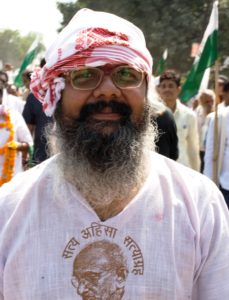 From humble beginnings three decades ago, Ekta Parishad (“unity forum” in Hindi), a pluralistic movement for defending rights of marginalized communities in India, has grown to become today one of the world’s most massive—and exemplary—nonviolent movements.
From humble beginnings three decades ago, Ekta Parishad (“unity forum” in Hindi), a pluralistic movement for defending rights of marginalized communities in India, has grown to become today one of the world’s most massive—and exemplary—nonviolent movements.
Last fall I met Ramesh Sharma, National Coordinator of Ekta Parishad, and came to realize the richness, depth, and intelligence of this movement. There is much to learn from their example of how to build self-reliance and alternative institutions—an often underemphasized yet critical source of strength and resilience in nonviolent conflict. In Ramesh’s view, self-reliance is a crucial part of “building creative mass consciousness.”
ICNC’s forthcoming glossary of civil resistance terms defines self-reliance as: “The capacity of a person or group to independently manage their own affairs, make their own judgments, take care of their own needs, and exercise self-determination and self-sufficiency.” To accomplish this, Ekta Parishad has developed its own governing structure, participatory leadership, and a culture of constructive engagement, which means encouraging people to contribute in specific ways towards the movement’s broader goal of rebuilding village and rural society in India.
Ramesh explains more fully below.
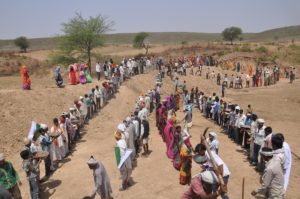
Click to expand. The drought-affected village of Jakhlaun in the Ashok Nagar District of Madhya Pradesh, where villagers are building a water conservation structure (May 2016). Source: Ramesh Sharma.
What is Ekta Parishad?
Ramesh: Think of us as a family represented by some 300,000 deprived families spread over 15 states of India. We welcome every idea, ideology, and inclination—committed to the doctrines of nonviolent conflict and nonviolence—directed towards peace and justice of marginalized communities in this country. Ekta Parishad's concepts of family membership and integrity, we believe, are the foundations of social and national integrity.
We are also an umbrella of 2,000+ social organizations, voluntary organizations, social movements, trade unions, cooperatives, and so forth, spread over the pan-Indian level. Together, our members magnify the voices of deprived communities for peace and justice, because we share holistic views of humanity and global village.
How is Ekta Parishad funded?
Membership fees of 10 Indian Rupees (USD 0.16) per family per year are collected by village committees and kept strictly for local use, as decided by unanimous resolution among committee members (mostly for collective needs). In every participating village, members also donate food grain and financial resources for their own local-level actions, including constructive program related work and mobilization actions.
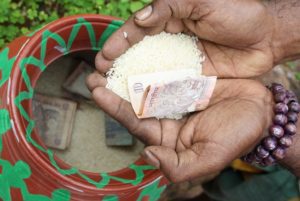
Click to expand. A villager collective’s earthen pot in which each Ekta Parishad family member contributes donations (money and food grain) for the organization. Tilda village in Chhattisgarh (2016). Source: Ramesh Sharma.
How does someone join the movement? What is the process?
Any believer in nonviolent ideology and actions may associate with Ekta Parishad and participate in different events. Any person may join Ekta Parishad formally by paying an annual membership fee, after which his or her entire family are considered members.
How does the movement membership model help build self-reliance?
Our membership approach is designed to create a feeling of oneness wherein everyone benefits from the same level of respect and responsibility. Village funds and grain banks serve as local resources that help build a sense of buy-in in process and outcomes. The grain bank has several specific uses: for example, conserving local seeds and grains, preserving food grains for periods of scarcity, and overall lessening local dependency on external sources of food. The village fund is understood as a readily available source of funds for various social purposes and local-level actions.
Ekta Parishad regularly encourages constructive actions on the ground, such as constructing village schools and health centers, digging water wells, repairing village ponds, building water conservation structures, reconstructing village roads, and so forth (ed: see photos throughout the article). These activities inspire many people, local officials, elected representatives, and others to come together for a common cause. Constructive engagement also communicates that in a democracy, responsibility does not solely lie with the state; everyone has the responsibility to use collective energies for constructing this democracy the way we want.
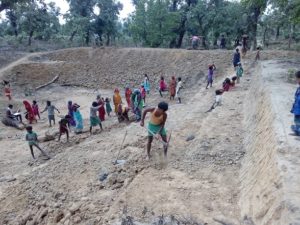
Click to expand. The drought-affected village of Tendutikra in the Korba District of Chhattisgarh, where villagers are building ponds for water conservation (May 2016). Source: Ramesh Sharma.
What are some of the concrete steps that Ekta Parishad takes to build self-reliance, for example, regarding agriculture?
Ekta Parishad promotes organic agriculture as a means of maximizing the use of local resources and minimizing dependency on debt-centered and cost-intensive agricultural systems. A majority of Ekta Parishad villages engage in organic agriculture. We seek to structure these villages into a federation of village cooperative collectives to motivate the food growers to grow healthy and ecological food, and to enhance their collective ownership in food production systems. Their cooperative federations help them engage in collective bargaining in the consumers market and minimize the risks and uncertainties of production and marketing.
This process was started in Madhya Pradesh, Chhattisgarh, Orissa, Bihar, Uttar Pradesh and Jharkhand where thousands of women are collectively farming and able to feed their families in a dignified way. We are observing an increasing level of self-reliance among these crop-centered and women-centered collectives. In the Kukshi area of the Dhar district in Madhya Pradesh, Ekta Parishad is promoting organic cotton production among small and marginal farming communities. They have linked their production with Bio Re (a Swiss Agency) for ethical marketing. In the last 15 years, hundreds of farmers and their cooperatives have benefitted from this. Similarly, in the Naubatpur area of Bihar, Ekta Parishad has been instrumental in bringing hundreds of women vegetable growers together to federate as a cooperative and get involved in the profitable and ecological production cycle.
How have these agricultural activities impacted movement building?
In the recent past, the activities I’ve just described supported larger mass mobilization among villagers, and more broadly have inspired many others throughout Indian society. By federating villagers with similar interests, they unite around a cause and their voices are amplified. By uniting the women farmers across state boundaries, their broader concerns and issues are brought into focus. Some of those issues include demanding for women to be recognized farmers and as entitled to certain rights and privileges under the law, and for more just policies to recognize and protect indigenous groups.
These issues concern many organizations well outside Ekta Parishad’s sphere and therefore open up space for alliance building. Many groups throughout Indian society are joining hands in campaign and advocacy: today, Ekta Parishad is closely associated and synergizing with more than 2,000 social organizations and grassroots movements.
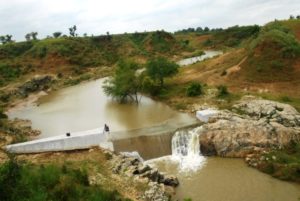
Click to expand. Villagers building a small dam in the Saunakpura village of Jhansi in Uttar Pradesh (2016). Source: Ramesh Sharma.
Can you tell us about some campaigns your movement has run to press for policy changes?
Ekta Parishad has achieved many successes on the ground by pressing for changes in the legal and policy framework at various levels. One recent example: In Madhya Pradesh, after a restless campaign that lasted 12 years, finally the Chief Minister of the State agreed to introduce and implement the Homestead Land and Housing Guarantee Act in 2017. This allows millions of homeless poor to claim land and housing rights. Now many other states have been adopting a similar approach and are addressing the issues of homeless poor.
How does a decentralized movement like Ekta Parishad govern itself and make decisions?
Ekta Parishad is strongly grounded in a decentralized decision process, where each village unit (represented by 20+ members) independently passes resolutions on local issues. Meanwhile, the federation of village units collectively can make decisions regarding actions at the district level and state level. At each level, a team of nominated representatives engage in participatory leadership. This means that after making decisions they also take leadership in carrying out those actions. The National Committee, as a team of senior members of Ekta Parishad, are only responsible in supporting the decided actions at various levels.
You’ve spoken extensively about what many call building ‘alternative institutions.’ Why is this nonviolent method important for realizing Ekta Parishad’s vision for tomorrow?
For Ekta Parishad, the concept of alternative institutions is understood as a complement to the process of building a democracy. Rather than saying 'alternative' we prefer the term Sarvodaya, a term that carries the ideology, values, and insights of 'well-being for all'—a more inclusive approach to alleviating burdens and boundaries, and making our dreams possible for all of us.
Institutions that are independent of the state of course support autonomy, but it is crucial that those institutions have a broad, inclusive, and pluralistic base. Because it is about more than just building democratic institutions; it’s also about enhancing India’s culture of democracy.
Note: This interview was edited for clarity. For more information related to Ekta Parishad events and activities or volunteering, send an email to ektaparishad@gmail.com.
Featured image: Villagers building a pond in the drought-affected Adhwara village of Sheopurkalan in Madhya Pradesh (2016). Source: Ramesh Sharma.

Amber French
Amber French is Senior Editorial Advisor at ICNC, Managing Editor of the Minds of the Movement blog (est. June 2017) and Project Co-Lead of REACT (Research-in-Action) focusing on the power of activist writing. Currently based in Paris, France, she continues to develop thought leadership on civil resistance in French.
Read More